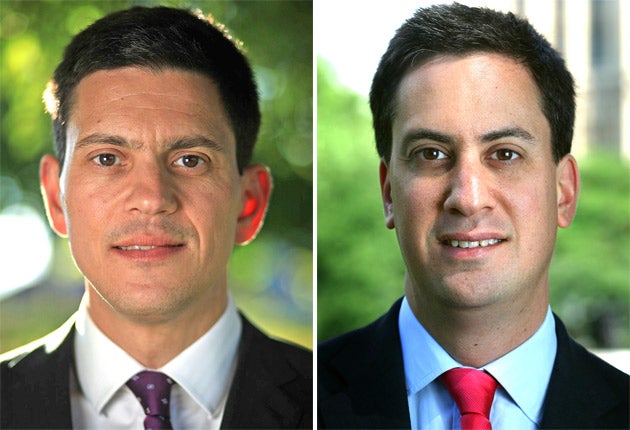David Miliband twice as popular as Ed, says poll

Your support helps us to tell the story
From reproductive rights to climate change to Big Tech, The Independent is on the ground when the story is developing. Whether it's investigating the financials of Elon Musk's pro-Trump PAC or producing our latest documentary, 'The A Word', which shines a light on the American women fighting for reproductive rights, we know how important it is to parse out the facts from the messaging.
At such a critical moment in US history, we need reporters on the ground. Your donation allows us to keep sending journalists to speak to both sides of the story.
The Independent is trusted by Americans across the entire political spectrum. And unlike many other quality news outlets, we choose not to lock Americans out of our reporting and analysis with paywalls. We believe quality journalism should be available to everyone, paid for by those who can afford it.
Your support makes all the difference.David Miliband is the choice of Labour voters to be the next leader of the party, according to a ComRes survey for The Independent.
He is more than twice as popular as his nearest rival, his younger brother Ed, when Labour supporters are asked to name their preferred candidate; who would make the best leader of the opposition; the best prime minister and have the best chance of leading Labour back to power.
The poll, conducted among more than 1,500 people who have voted Labour at least once since 1992, found that David Miliband was also the most likely of the five Labour leadership candidates to win over floating voters and those people who backed Labour in 2005 but switched to the Liberal Democrats or Conservative Party this year.
The findings are a boost for David Miliband, who faces a close fight with his brother when the result of the contest is announced on 25 September. However, Ed Miliband allies suggested the findings reflect the fact that David is better known among the public. They insisted that Ed is on course for victory because he is more popular and better known in the party, pointing out that 44 per cent of the public also replied "don't know" when asked to name their preferred candidate.
David Miliband is the preferred choice of 26 per cent of Labour voters, compared to 11 per cent for his brother; 8 per cent for Diane Abbott; 7 per cent for Ed Balls and 5 per cent for Andy Burnham.
The former Foreign Secretary enjoyed a bigger lead when those polled were asked who would make the most effective leader of the opposition. Some 30 per cent said David Miliband; 12 per cent Ed Miliband; 7 per cent Mr Balls; 5 per cent Ms Abbott and 4 per cent Mr Burnham.
Although Ed Miliband has described himself as the candidate most likely to win back former Labour voters who have switched to the Liberal Democrats, the survey suggests that David would be more successful.
Asked who would appeal most to wavering voters, 35 per cent of people who backed Labour in 2005 but Nick Clegg's party this year chose David, while only 5 per cent opted for Ed. Among voters who switched from Labour to the Tories, 21 per cent named David and 12 per cent Ed.
When Labour switchers to the Liberal Democrats were asked who was most likely to get Labour elected to government, David Miliband scored 39 per cent, well ahead of his brother and Ed Balls, both on 5 per cent.
According to ComRes, David Miliband is by far the most popular leadership candidate among people who stuck with Labour this year.
He is the preferred choice of 31 per cent of them, while 12 per cent opt for his brother; 8 per cent for both Ms Abbott and Mr Balls and 5 per cent Mr Burnham. Significantly, 40 per cent of people who voted Labour this year believe David Miliband is most likely to get the party back into government, well ahead of his brother's 11 per cent.
But there is a regional dimension to the results. Mr Burnham, MP for Leigh, scores 15 per cent in the north-west; Ms Abbott, MP for Hackney North and Stoke Newington, scores her highest proportion (13 per cent) among London Labour voters, and Mr Balls, MP for Morley and Outwood, gets 12 per cent among Yorkshire and Humberside Labour voters, compared with 7 per cent among all Labour voters. However, David Miliband is still ahead in all regions.
ComRes interviewed 1,569 Labour voters online between September 3-10, 2010. Respondents were GB adults who have voted for the Labour Party at least once at a general election in the last 20 years. ComRes is a member of the British Polling Council and abides by its rules. Full tables available at: www.comres.co.uk.
Join our commenting forum
Join thought-provoking conversations, follow other Independent readers and see their replies
Comments